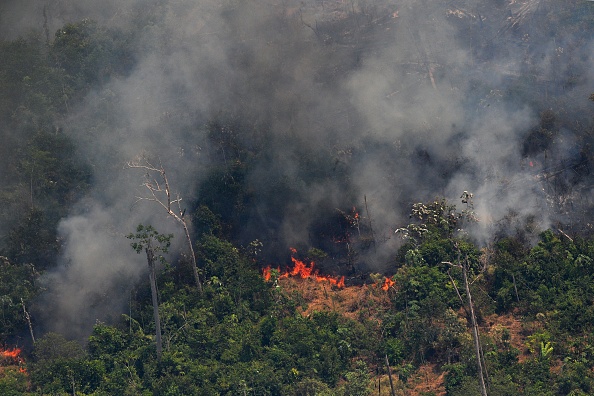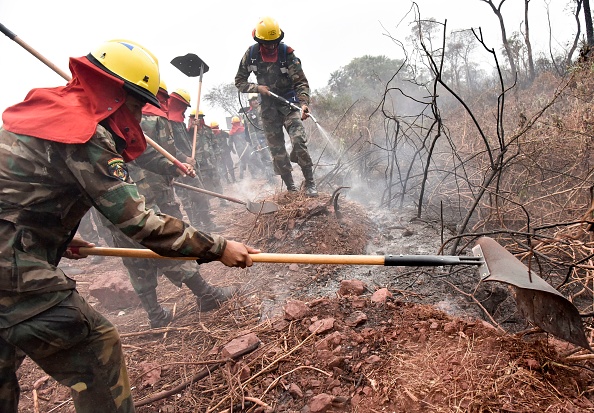Bolsonaro views international concern over the fires in the Amazon as a threat to his country’s sovereignty. He and a coterie of closely allied ministers and advisers—known collectively as the “ideological faction” of the Bolsonaro government—ascribe the criticism to a globally coordinated campaign to weaken Brazil’s territorial integrity and keep it from developing economically. During the 1970s, when a military dictatorship governed Brazil, nationalists zealously promoted the notion of an international conspiracy bent on undermining the country’s sovereignty. Bolsonaro remains nostalgic for the era of the dictatorship. By striking its chords amid the environmental outcry, he assumes the role of culture warrior, fighting the “globalism” and “cultural Marxism” of international institutions and foreign-funded civil society organizations.
Bolsonaro’s ideological posture led him to dig in on the forest fires, and he was further aggravated by a personal dispute with Macron. But as the fires and the opprobrium continued to rage, worried advisers convinced the president to dispatch 43,000 soldiers to the forest. Moving troops to the forest to fight the fires—a palliative measure—is unlikely to change the international perception of Brazil. Safeguarding the Amazon will require a broad reversal of Bolsonaro’s environmental agenda.
Two of the three factions in Bolsonaro’s government—his associated ideologues and members of the military—are unlikely to embrace such a reversal. These factions share the fundamental view that environmentalists may threaten Brazil’s sovereignty. The third faction, composed of liberal economists and business interests, still has an outside chance to convince Bolsonaro to adopt necessary environmental policies by appealing to Brazil’s long-term economic and foreign policy interests.

THE IDEOLOGUES AND THE GENERALS
Forest fires occur every year in the Amazon. The year before Bolsonaro took office, from 2017 to 2018, Brazil’s Amazon forest lost nearly one billion trees. The current government is not the first to neglect the problem. Nonetheless, its contempt for the environment is particularly brazen, and this year’s deforestation will almost certainly surpass last year’s figure.
Bolsonaro and Ricardo Salles, Brazil’s minister of the environment, do not believe in climate change. The president campaigned on promises to cut back government protections for the rainforest. He has made good on that pledge in part by slashing the budget for Ibama, Brazil’s environmental watchdog, which enforces regulations and imposes fines for illegal logging and other encroachments. The government sacked the head of the National Institute for Space Research, which publishes data on deforestation. (Scientists at the institute claim that fires this year are up 35 percent from the average of the past eight years.) And the president has fostered an atmosphere of impunity, encouraging loggers, ranchers, miners, and farmers to breach regulations and cut into the forest. Government agencies have imposed far fewer fines this year than in previous years.
The Bolsonaro government has made no secret of its hostility toward environmental NGOs and international conservation efforts. Without providing evidence, Bolsonaro accused environmental NGOs of having started the fires. And the government has questioned the value of the Amazon Fund, an enormously successful conservation program financed by the Norwegian and German governments. Over the past decade, Norway has committed more than $1 billion to the fund, which supports hundreds of projects across the Amazon to reduce deforestation. NGOs play a significant role in managing the fund—an arrangement the donors consider crucial to its success. But in May, Salles demanded a reduction in the NGOs’ role—a deliberate provocation that predictably led Norway and Germany to suspend their payments. “Isn’t Norway that country that kills whales up there in the North Pole?” Bolsonaro quipped.

Ideologues in the Bolsonaro government, including the president’s powerful son Eduardo, the Foreign Minister Ernesto Araújo, and Salles, seem to welcome international ostracism. Bolsonaro thrives on controversy and conflict, and the international criticism helps strengthen the president’s narrative that powerful forces are at work to undermine him, even while it helps rally his government’s most ardent supporters around the flag. The more hostile international rhetoric becomes, the more Bolsonaro will embrace a “bunker mentality,” entrenching himself in opposition to world leaders such as Macron. The Brazilian president may not even be that bothered that his handling of the fires is threatening a major free-trade deal between Brazil and the European Union. Unlike Paulo Guedes, Bolsonaro’s economically liberal minister of the economy, the president is an economic nationalist who has favored protectionist policies all his political life.
To the extent that the radicalism of Bolsonaro’s ideological faction threatens the country’s economic interests, Brazil’s generals have acted as a moderating force. Vice President Hamilton Mourão, a former army general, has shouldered this duty. In the months after Bolsonaro’s election victory in October 2018, Bolsonaro and Araújo repeatedly attacked China, Brazil’s most important trading partner. Mourão worked tirelessly behind the scenes to undo the damage, traveling to Beijingto meet Chinese premier Xi Jinping in a show of goodwill. The vice president played a similar role in a recent contretemps between Bolsonaro and the president of Argentina.
Environmental policy, however, is a different matter altogether. Those who expect the military faction to act yet again as the adult in the room and provide a check to Bolsonaro are likely to be disappointed. Mourão himself has expressed doubts about whether climate change is actually man-made. The armed forces are fully aligned with the president’s views on sovereignty and international interference. The former commander of Brazil’s army, the influential General Eduardo Villas Boas, closed ranks with Bolsonaro when he rejected international criticism as a “direct attack on Brazilian sovereignty.”
LIBERALS TO THE RESCUE?
With both the ideological and military factions of the government shrugging off international pressure, the government’s third faction, the neoliberals, has begun to mobilize against the president’s environmental policies, reaching out to agribusiness and civil society.
The liberal faction is led by Brazil’s minister of agriculture, Tereza Cristina, and by Guedes, and it includes many skilled technocrats in the ministry of the economy. Both worry that Bolsonaro's posture on the forest fires will disturb trade negotiations and undercut efforts to liberalize and restart Brazil’s sluggish economy. Brazilian diplomats privately concede that the furor is likely to delay or even prevent the country’s long-sought accession to the Organization for Economic Cooperation and Development. And the Europeans could still refuse to ratify the EU-Mercosur trade deal, a pact that is estimated to add nearly $90 billion to Brazil’s economy over the next 15 years, and which Bolsonaro counts as one of his biggest foreign policy achievements.
The stakes are not lost on Brazil’s business leaders, particularly in agribusiness, which accounts for more than 20 percent of the country’s GDP. The European Union currently buys $5 billion worth of Brazilian soy per year. Marcello Brito, head of the powerful Brazilian Agribusiness Association, recently warned that “it is only a matter of time” before the fires prompt boycotts of Brazilian products. In such a scenario, Brito noted, Brazil would struggle enormously to “regain confidence” abroad.
In the contest among the three factions that make up Brazil’s government, the liberal pro-business faction holds one trump card, and that is the parlous state of Brazil’s underperforming economy and the swelling ranks of its 13 million unemployed. Unless he can manage a return to significant economic growth, Bolsonaro will not likely see his low approval ratings recover. His government has bowed to pressure from the business sector before. As president-elect in the fall of 2018, Bolsonaro expressed willingness to withdraw from the Paris agreement on climate change. Ambassadors from European Union member states coordinated a pressure campaign, meeting one-on-one with Brazilian congressmen representing agribusiness. The European diplomats told the lawmakers that if Brazil left the Paris agreement, consumers across Europe would boycott Brazilian products. Days later, Salles, the environment minister, announced Brazil would not abandon the commitments it made in Paris.
And yet European pressure may not make much of an impression on Brazil’s domestic policy. Unlike the big agricultural associations, Brazil’s small farmers continue to support Bolsonaro’s loosening of environmental protections. With less exposure to the international market, these farmers tend to prefer lax environmental rules. They are often actively involved in deforestation and disinterested in, or unaware of, its global repercussions. And Brazil will not be without trading partners in case of a European boycott: China buys 80 percent of Brazil’s soy exports, and this relationship has proved unresponsive to Bolsonaro’s shredding of environmental protections.
Bolsonaro certainly faces little pressure from the White House. At the G-7 meeting in Biarritz this month, U.S. President Donald Trump, himself a climate skeptic, dismissed the Amazon conflagration as a “niche issue.” Even European leaders are not united in their approach. Macron has adopted an aggressive strategy, accusing the Brazilian president of lying and insisting that he won’t ratify the EU-Mercosur deal under current circumstances. German Chancellor Angela Merkel disagrees, arguing that refusing to ratify the trade deal will not prevent “a single hectare” from being illegally logged in Brazil’s rainforest.
Sending troops to the Amazon to contain the fires is laudable but insufficient. To really protect the rainforest and take Brazil’s environmental responsibilities seriously, Bolsonaro must reverse his government’s systematic weakening of its environmental protection agency. He must explicitly recognize that climate change is real. And he should accept that NGOs make positive contributions in combatting deforestation.
Such an about-face is highly unlikely. Bolsonaro’s ideological anti-environmental views are deeply intertwined with his entire political project. Economic liberals can raise the specter of a scrapped trade deal with the European Union, consumer boycotts, and denial of OECD membership—but such pragmatic concerns may not sway a president so committed to defiance, no matter the cost.
This article was originally published on ForeignAffairs.com.






